Since the Korean War, North Korea has been isolated from the rest of the world and governed by a communist regime. But is North Korea really communist? Some experts say that North Korea is more of a dictatorship than a communist state.
There is no one-size-fits-all answer to this question, as there is considerable debate over whether or not North Korea is truly communist. Some facets of the North Korean government, such as the country’s centrally-planned economy and strict controls on civil liberties, point to a communist system. However, others argue that North Korea’s unique brand of “Juche” socialism, which emphasizes self-reliance, is not truly communism. Ultimately, whether or not North Korea is communist is a matter of interpretation.
What is North Korea’s political ideology?
The Juche idea is the state ideology of North Korea and the official ideology of the Workers’ Party of Korea. North Korean sources attribute its conceptualization to Kim Il-sung, the country’s founder and first leader. The Juche idea emphasizes self-reliance, independence, and self-sufficiency, and is often described as “Kim Il-sung’s original, brilliant and revolutionary contribution to national and international thought”. It is also a political philosophy that serves as the foundation of the North Korean government.
The communist states in the world today are in China, Cuba, Laos, Vietnam, and North Korea (DPRK). These states often do not claim to have achieved socialism or communism in their countries but to be working toward the establishment of socialism. In many ways, these countries are still struggling to meet the needs of their citizens and achieve economic stability. However, they continue to be an important part of the global community and their citizens continue to fight for their rights and improve their standard of living.
Is there a communist Party in North Korea
The Workers’ Party of Korea (WPK) is the founding and sole ruling party of the Democratic People’s Republic of Korea, commonly known as North Korea. Founded in 1949 from the merger of the Workers’ Party of North Korea and the Workers’ Party of South Korea, the WPK is the oldest active party in Korea. The WPK played a crucial role in the establishment of the DPRK in 1948 and continues to be the ruling party today. The party’s ideology is based on Juche, self-reliance, and socialism, and the party is committed to the construction of a socialist society in North Korea.
The Democratic People’s Republic of Korea, or North Korea, is an authoritarian state that has been led by the Kim family for 70 years. The country is known for its strict controls on its citizens, as well as its nuclear and missile programs.
Is North Korea a communist or dictator?
North Korea is an independent socialist state that holds elections, though they have been described by independent observers as sham elections. North Korea is a totalitarian dictatorship with a comprehensive cult of personality around the Kim family.
North Korean citizens usually cannot freely travel around the country, let alone travel abroad. Emigration and immigration are strictly controlled. This means that people are not able to move freely within the country or leave the country if they wish. This lack of freedom of movement is a human rights violation.
When did Russia stop being communist?
In Russia, the Communist Party traces its roots back to the Bolshevik wing of the Russian Social Democratic Labour Party (RSDLP), which was founded by Vladimir Lenin in 1912. After the February Revolution of 1917, the RSDLP split into two factions: the Mensheviks and the Bolsheviks. The Bolsheviks, led by Lenin, eventually came to power in the October Revolution of 1917, and established the Soviet Union in 1918. In 1991, the Soviet Union was dissolved, and the Communist Party of the Soviet Union was banned.
Marxism–Leninism is a political ideology that emerged from the Russian Revolution of 1917. It advocates the establishment of a socialist state that would be run by a single party that would represent the interests of the working class.
The key difference between communism and socialism is that communism is an economic and political system in which property and resources are owned and controlled by the state, and the distribution of goods is based on need. Socialism is an economic and political system in which property and resources are owned and controlled by the community, and the distribution of goods is based on need.
In Vietnam, all organs of the government are controlled by the Communist Party. Most government appointees are members of the party. This ensures that the party has a firm grip on power and can effectively pursue its policies.
Is North Korea a capitalist country?
The North Korean economy is built on the principles of Juche, which emphasize self-sufficiency and self-reliance. The government centrally plans the economy and allocates resources to different sectors and enterprises. The role of market allocation schemes is limited, although there are some elements of a market system, such as prices and wages, that help to improve efficiency.
The country is culturally and economically isolated as many suffer from malnutrition and live in extreme poverty. North Koreans go to work every day on farms, in factories, and in the capital of Pyongyang.
What is not allowed in North Korea
If you are planning a visit to North Korea, it is important to be aware of the country’s strict laws about what you can bring into the country. All religious, pornographic or political items are illegal, and you must declare all published material and electronic devices when you arrive. It is also illegal to knowingly or unknowingly possess items that breach North Korean law.
Since the mid-1990s, North Korea has been in darkness. Fuel stopped flowing from the Soviet Union to North Korea, and the country has been unable to produce enough energy to meet its needs. The lack of electricity has led to a significant decline in the quality of life for North Koreans. Hospitals are without power, and many people must resort to burning coal or wood to cook and heat their homes.
Why is North Korea a dictatorship?
The North Korean political system is highly centralized, with the Workers’ Party of Korea (WPK) having legal supremacy over all other political parties. The constitution defines North Korea as “a dictatorship of people’s democracy”, and the WPK is the only party allowed to contest elections. All government officials are required to be members of the WPK, and the party controls all aspects of government and society. Daily life is heavily controlled by the state, and citizens are expected to show loyalty to the regime. Dissent is not tolerated, and North Koreans who attempt to leave the country or criticize the government are severely punished.
With the end of economic aid from the Soviet Union, North Korea has had to find other ways to sustain its economy. However, due to the impractical ideological application of Stalinist policies in North Korea, the economy has been in a state of slowdown for many years. In recent years, North Korea has been trying to find ways to keep its economy afloat, but it has been difficult due to the continued receding of economic aid.
Conclusion
There is some debate over whether North Korea is truly communist or not. While the country’s ruling party is the Workers’ Party of Korea, which follows Marxist-Leninist ideology, there are some who argue that North Korea is more of a dictatorship than anything else. Others say that North Korea is a socialist state, but not communist because it does not meet all of the criteria laid out by Karl Marx. Ultimately, there is no one answer to this question.
There is no one-size-fits-all answer to this question, as the answer depends on one’s interpretation of communism. However, based on an analysis of the country’s history, economic system, and political structure, it is possible to argue that North Korea is not a communist state in the traditional sense.





